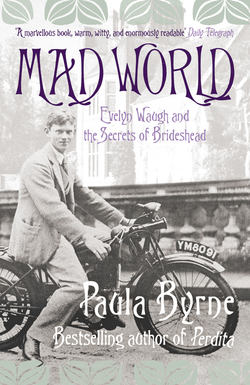Читать книгу Mad World: Evelyn Waugh and the Secrets of Brideshead - Paula Byrne - Страница 11
CHAPTER 6 The Lygon Heritage
Оглавление‘A party of queer men from London arrived to see Hugh yesterday,’ wrote Robert Byron to his mother from Oxford. ‘As he is at Madresfield celebrating his majority with becoming pomp, I looked after them.’
A night in their company provided some compensation for his not being at Hugh’s party himself. The previous year, by contrast, Byron had attended the coming-of-age party of Hugh’s older brother, Elmley. He had been overwhelmed by the sheer scale of the event, and deeply impressed by the organisation of Lord Beauchamp, who had conducted the celebrations as if they were a military campaign. Hugh’s coming-of-age party was also held at Madresfield Court. Once again, no expense was spared – even though Hugh was the ‘spare’ and not the ‘heir’.
Until Evelyn Waugh appeared at Madresfield in 1931, Robert Byron was the most favoured Oxford friend of the aristocratic Lygons. He had known them since Eton. During the summer months he stayed with them at Walmer Castle in Kent, where Lord Beauchamp put in an annual stint in his capacity as Warden of the Cinque Ports. It was there that the earl acquired his family nickname (only to be used behind his back) ‘Boom’. At Walmer, Byron met the striking Lygon sisters. Lettice, the oldest of them, was particularly lovely. He judged her ‘the most beautiful human being I have ever seen – oversize feet and yet the most lovely figure’. Byron in turn made a lasting impression on eleven-year-old Coote: she never forgot his ‘café au lait suit’ and his pince-nez spectacles.
In 1923, Lord Beauchamp invited Byron to accompany him and his sons on a tour of Italy during the Easter vacation. Byron later credited Hugh’s father as the man who opened his eyes to the world and the wonders of foreign travel. He himself became a renowned travel writer. Many critics consider his book The Road to Oxiana (1937) to be the foundation stone of the modern genre of literary travel-writing.
Byron kept a diary, and his remarks about the earl shed light on how someone of Evelyn’s generation (with their well-documented anger at their fathers) saw this rather unusual patriarch. Venice was Lord and Lady Beauchamp’s favourite Italian city, so the travel party went there first before moving on to the historic towns of northern Italy, after which they headed south to Naples and the island of Capri.
Byron remembered that Hugh’s father was an indefatigable sightseer ‘who maps out every moment of every day, weeks beforehand’. Whilst they were in Venice their travel bible was Ruskin. In Florence and Rome, it was Augustus Hare. Byron’s diary details the churches and galleries they visited, as well as the obscure little restaurants that Lord Beauchamp insisted upon frequenting – he had a passion for local Italian dishes. Byron was suspicious that the secondi piatti sometimes consisted of horse meat.
It was this visit that first inspired Byron’s love for Byzantine art, and he had the most knowledgeable of teachers in Lord Beauchamp. Byron’s greatness as a travel writer came from his way of finding the essence of a culture in a magical alchemy of its architectural history and the customs of its people. It was Beauchamp who sharpened the young man’s eye, wherever he went, for both the buildings and the locals. For his part, the earl was delighted to have a boy in the party who shared his interests and enthusiasms. Hugh was emphatically uninterested in culture – his boredom was an endless source of exasperated amusement to the other men. Lord Elmley took a little more interest, but Robert was the passionate sightseer. He was the kind of son for whom Beauchamp had longed. In Florence the party dined with Harold Acton at his exquisite family home, La Pietra. Acton took them to the famous tea-rooms, Doney’s, and to the nightclub, Raiola’s. This was the first time that Hugh became animated.
Byron recalled his wonder as the party climbed to the top of Giotto’s bell tower in Florence. Hugh showed little interest in the magnificent view. He stood reading the Daily Sketch whilst Robert was overcome by the view of the Duomo and the other historic buildings. Hugh was more interested in the racing news and the gossip column report on the London party scene.
In Assisi, Lord Beauchamp and Robert Byron inspected in minute detail Cimabue’s frescoes in the vault of the upper basilica of the church of St Francis. Hugh complained about missing breakfast and then moaned about the luncheon menu. Doting father that he was, Beauchamp could not help calling his adored second son ‘something of a little philistine’. But Hugh, tall, languid and charming, could get away with anything.
They had arrived in Florence by train. Having exhausted the sights of the city, Beauchamp hired an enormous motor car for the drive south to Assisi and Rome. By this time they were all beginning to be fatigued by their exertions with Ruskin and Baedeker in hand. After ten days’ recuperation on the island of Capri, they left for England.
